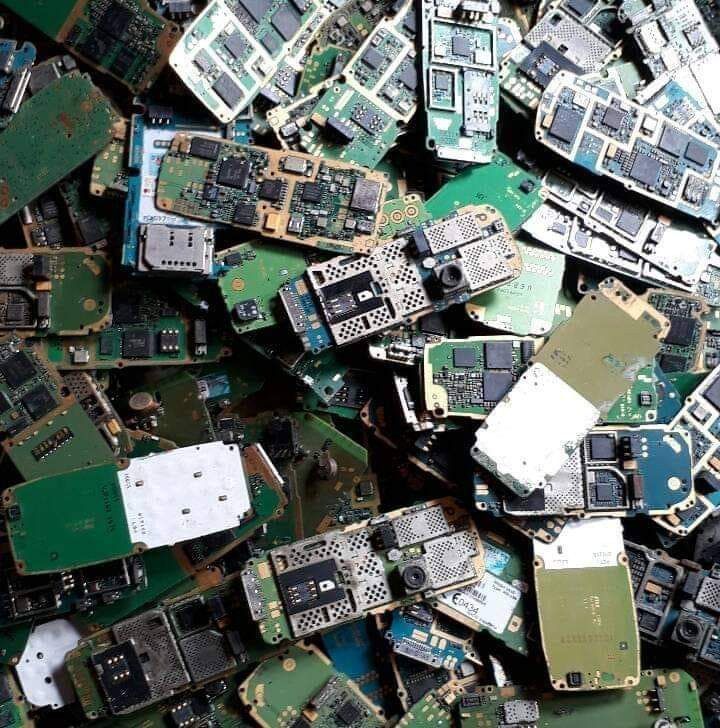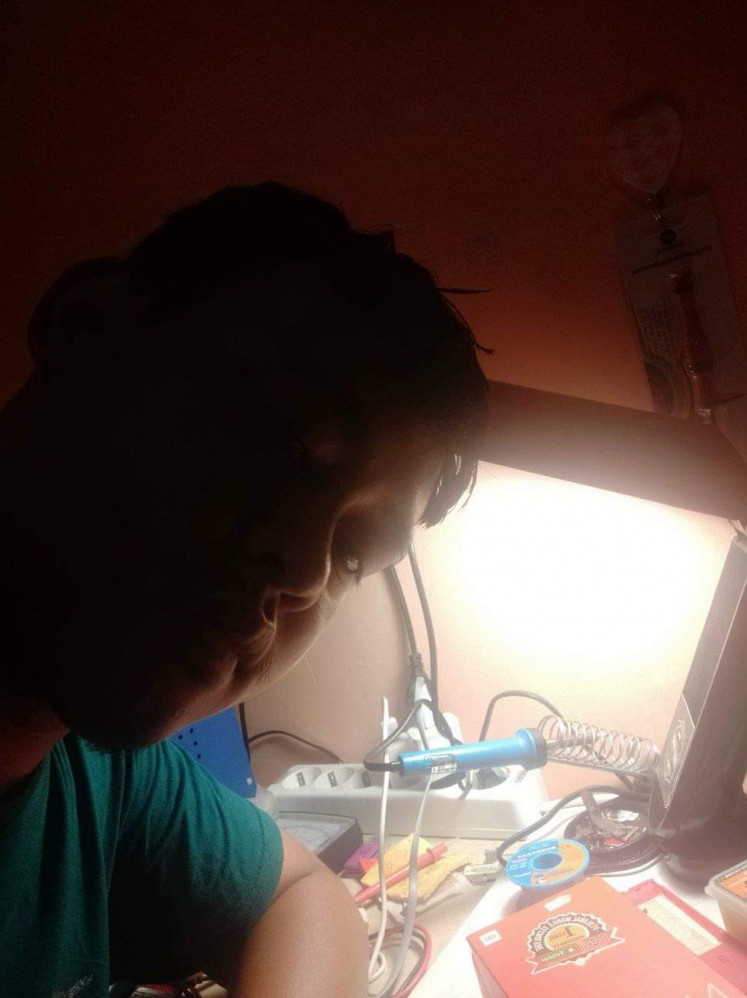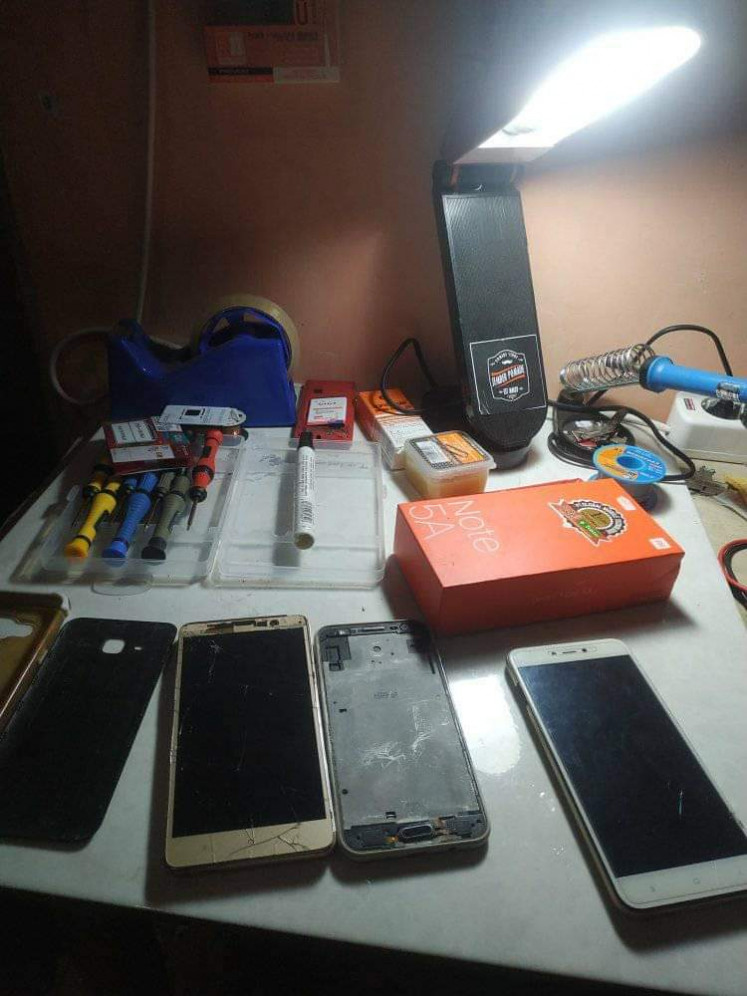Popular Reads
Top Results
Can't find what you're looking for?
View all search resultsPopular Reads
Top Results
Can't find what you're looking for?
View all search resultsSecond life: The self-employed techies repairing and repurposing used phones
A niche group of self-employed, tech-savvy individuals are cannibalizing, refurbishing and repurposing old mobile phones, making the must-have devices more affordable while helping to reduce the harm that technology and high-tech consumerism can do to the environment.
Change text size
Gift Premium Articles
to Anyone
W
hen a phone breaks or stops working, its owner might take it to a repair shop or replace it with a new one. But those who can’t afford to do either sell their phones to people who make a livelihood by fixing and reselling them.
“Aris Santana”, the alias of a 30-year-old used phone buyer in Jakarta, has been in the business for more than five years. He uses Facebook to offer to buy used phones, no matter their condition.
"I receive a lot of broken phones, around four boxes a week. Their number reaches hundreds," said Aris, referring to the cardboard boxes for mineral water bottles he uses as a unit of measurement.
He stores the phones in these used boxes before disassembling them to removes part like the printed circuit board (PCB). He then sells the cannibalized components to vendors that extract precious metals and minerals from them.
"We usually send them to Wonosobo [Central Java], where they process the PCBs and extract the gold from it."
There is a reason why PCBs are special. According to a 2019 study published in open-access journal Scientific Reports, waste printed circuit boards (WPCBs) have significant residual value because 28 percent of their weight is made up of high-grade precious metals such as gold, silver and palladium. In addition, the grade of the metals contained in PCBs is more than 100 times higher than that extracted from nature.
The older, the better
Puguh, a resident of Madiun, East Java, who has only one name, has been in the used phone business since 2016. Along with his wife, he makes his rounds of the town’s mobile phone shops and service centers that might be looking to sell the nonfunctioning or broken phones they have.
Used phones are sold on the cheap in his hometown. "One Grade A Nokia phone sells for Rp 10,000. Others, including the new Nokia models and Android phones, sell for Rp 7,000 each," he said, referring to a price range of 49 to 69 US cents.
“Grade A” refers to older Nokia phones, which Puguh says have larger PCBs and therefore more surface area for processing to extract metals and minerals. Android phones are not valued as much, because they are sent overseas to be recycled.
Read also: From Shell to Unilever, plastics polluters back recycling-tech flops
After buying up all the used phones he can find, Puguh resells them to someone he calls “the boss”, who then takes out the PCBs to extract the "treasure" contained within. “The boss” also buys other parts cannibalized from computers, tablets and radios.
Extracting the precious materials from the WPCBs involved using hazardous chemicals that only trained professionals should handle, Puguh stressed, although he conceded that online tutorials were easily found if one knew where to look.
"All I know is the boss uses nitric acid and some other chemicals," he said.
According to Puguh, 1 kilogram of Grade A Nokia WPCBs can net Rp 870,000 ($60), whereas 1 kg of WPCBs from newer phones will net only up to Rp 750,000 ($52). He earns less in some months because Grade A Nokias are in short supply nowadays as more people become aware of the value of WPCBs.
"If they are a player [...], they sell them for higher [prices]," said Puguh, who now depended on technicians who were unfamiliar with the WPCB business.
Phones for the people
Aris and Puguh are just two of the many tech-savvy Indonesians earning a living by buying and reselling WPCBs. The “extractors” only purchase the components in bulk, so they need to collect used phones to turn a profit.
This is not the case for Ade Eka Saputra, a 23-year-old phone technician in Jember, East Java, who reconditions and refurbishes used phones with an aim to provide affordable technology for all.
One-stop techie: Ade Eka Saputra sits at his work station in Jember, East Java. Aside from offering mobile phone repair services, Ade also reconditions and refurbishes used phones for reselling them on Facebook at reasonable prices. (Personal collection/Courtesy of Ade Eka Saputra)Aside from offering repair services, the former bird trader also buys used phones to recondition and refurbish them: the former involves replacing faulty components and the latter, repairing malfunctioning components.
"I sell them as [functional] phones. I don't take them apart for their [components]," he said.
Read also: E-waste a major challenge for the planet
Once he has reconditioned or refurbished a phone, he offers it for sale on Facebook. Sometimes, he sells the refurbished phones to friends and acquaintances.
The trade was not always profitable, especially if the phone needed more work than he had initially assessed. The current situation did not help. "It's hard to find [spare parts] during the pandemic," said Ade.
Tools of the trade: Mobile phone handsets, frames, parts and other equipment crowd a corner of Ade Eka Saputra's work station in Jember, East Java. (Personal collection/Courtesy of Ade Eka Saputra)Ade sells reconditioned and refurbished phones at reasonable prices, typically between Rp 100,000 ($7) and Rp 500,000 ($35) for a profit of between Rp 50,000 and Rp 100,000 per phone, though sometimes he only breaks even.
Asked whether a customer had ever complained about one of his phones, whether reconditioned or refurbished, he answered: "Not yet."
Ade hopes that the quality of his phones will attract more customers. "In the future, I hope that the price of [...] reconditioned phones will be more affordable. I also hope [my] business will keep growing," he said.
ohmg













